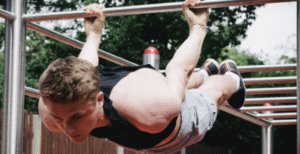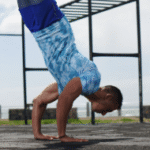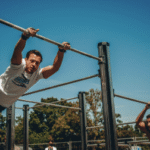What Qualifications Matter in a Personal Calisthenics Coach?
- Foundational (General) Personal Training Certifications: The Baseline of Professionalism
Before specializing in calisthenics, a good private coach should hold at least one NCCA-accredited (National Commission for Certifying Agencies) personal training certification. NCCA accreditation is the “gold standard” in the fitness industry, signifying that the certification program meets rigorous standards for validity and reliability. These certifications provide a crucial of anatomy, physiology, biomechanics, exercise science, program design principles, and client safety.
Reputable NCCA-accredited organizations include:
NASM (National Academy of Sports Medicine): Known for its “Optimum Performance Training (OPT)” model, which emphasizes integrated training (flexibility, core, balance, strength, power). Many trainers in Houston are NASM-certified.
ACSM (American College of Sports Medicine): Highly respected for its strong research-based approach and scientific rigor. Often preferred by medical professionals.
ACE (American Council on Exercise): Focuses heavily on client behavior change, communication, and a comprehensive approach to fitness.
NSCA (National Strength and Conditioning Association): Offers two primary certifications:
NSCA-CPT (Certified Personal Trainer): For general fitness professionals.
CSCS (Certified Strength and Conditioning Specialist): A more advanced certification, often sought by coaches working with athletes or in performance-focused settings, requiring a bachelor’s degree. It’s excellent for progressive overload and periodization applicable to calisthenics.
Why these are foundational: These general certifications provide the essential knowledge base for safety (e.g., contraindications, basic injury prevention), client assessment, and fundamental program design. A coach specializing in calisthenics still needs to understand these basics before delving into advanced bodyweight movements.
- Specialized Calisthenics & Bodyweight Certifications: The Core Expertise
While general CPTs provide a foundation, they often lack the in-depth knowledge required for the nuanced progressions, specific mobility demands, and advanced skills of calisthenics. This is where specialized certifications become critical. They demonstrate that a coach has dedicated time to the unique methodology of bodyweight training.
Key specialized calisthenics certifications and programs to look for:
Progressive Calisthenics Certification (PCC) by Al Kavadlo & Danny Kavadlo (Dragon Door):
Value: This is one of the most widely recognized and respected certifications within the calisthenics community. It emphasizes systematic progressions for mastering various bodyweight skills (e.g., push-ups, pull-ups, squats, muscle-ups, handstands, levers, human flag). It teaches coaches how to break down complex movements into achievable steps for clients of all levels. The “Progressive” aspect is key to sustainable calisthenics.
WSWCF Academy (World Street Workout and Calisthenics Federation) Calisthenics Trainer Online Certification:
Value: This certification is internationally recognized and focuses on practical skills, coaching methodology, program design, and even sports science related to calisthenics. It’s approved by NASM and AFAA, giving it good standing. It emphasizes learning from world-class athletes.
School of Calisthenics (Online/Hybrid Programs):
Value: While not a “certification” in the same NCCA-accredited vein as a CPT, the School of Calisthenics offers highly reputable and detailed training programs and educational content designed by expert coaches (often with Master’s level qualifications). Participation in their coaching programs indicates a deep of calisthenics principles and application.
GymnasticBodies (Coach Certifications/Seminars by Coach Christopher Sommer):
Value: Extremely rigorous and highly respected, focusing on gymnastics strength and conditioning principles for adults. While intense, trainers exposed to this methodology (even if not fully certified through the full program) gain profound insights into body control, mobility, and highly specific strength progressions essential for advanced calisthenics.
Other Specialized Workshops/Certifications:
Many calisthenics specialists offer their own workshops or certifications focused on particular skills (e.g., dedicated handstand workshops, muscle-up seminars, specific mobility for calisthenics). While not broad certifications, participation indicates focused expertise.
Look for trainers who mention continuous learning from figures like Ido Portal (known for movement culture), though his is more of a mentorship philosophy than a traditional certification.
Why these are vital for calisthenics: These specialized credentials confirm that a coach understands the unique biomechanics of bodyweight exercises, how to implement progressive regressions and progressions safely, and the specific conditioning needed to prevent injuries common in calisthenics (e.g., joint strain from improper handstand alignment). They teach coaches the “art” of spotting and cueing for bodyweight mastery.
- Complementary Certifications: Adding Layers of Expertise
Beyond the core and specialized calisthenics certifications, certain additional credentials can significantly enhance a coach’s value:
Mobility & Movement Certifications:
FRCms (Functional Range Conditioning Mobility Specialist) / Kinstretch: These methodologies focus on developing active range of motion and joint control, which is incredibly important for calisthenics to prevent injury and unlock skills.
Yoga/Pilates Instructor: A background in these disciplines can provide a deeper of body awareness, core control, and flexibility, which are foundational to calisthenics.
Nutrition Certifications:
Precision Nutrition (PN1/PN2): Provides excellent foundational knowledge in nutrition coaching and behavior change. While a personal trainer cannot provide medical nutrition therapy or detailed meal plans (that requires a Registered Dietitian Nutritionist – RDN), a PN certification equips them to offer valuable guidance on healthy eating habits that support training and recovery.
Corrective Exercise Specialist (CES – often offered by NASM/ACE): Useful for trainers working with clients who have muscle imbalances or are recovering from injuries, enabling them to design safer and more effective programs.
CPR/AED and First Aid Certification: This is absolutely mandatory for any fitness professional. It ensures they can respond effectively in an emergency situation.
- Beyond Certifications: What Else to Look For in Houston
While certifications are a great starting point, they are not the only factor. For a private calisthenics coach in Houston, also consider:
Experience & Portfolio: How many years of experience do they have coaching calisthenics specifically? Can they show client success stories, especially with goals similar to yours (e.g., before/after photos, videos of clients performing skills)?
Personal Practice & Proficiency: Does the coach actively practice calisthenics themselves? While they don’t need to be an elite athlete, their own dedication and ability to demonstrate proper form are important.
Communication Style: Do they explain concepts clearly? Are they patient? Do they provide effective cues that resonate with you? Many Houston gyms or private studios offer a complimentary consultation or intro session – use this to assess compatibility.
Client Testimonials: Look for reviews or testimonials that specifically praise their coaching style, ability to help with form, and success in achieving calisthenics-specific goals.
Continuing Education: Do they actively pursue ongoing education, attending workshops, seminars, or reading current research? The fitness industry is constantly evolving.
Location: Are they conveniently located in Houston (e.g., in a specialized studio in The Heights, Montrose, or a private gym in your area) or do they offer mobile training in local parks?
In summary, when seeking a private calisthenics coach in Houston, look for a professional who combines a solid foundational personal training certification (like NASM, ACE, ACSM, or NSCA) with specific, reputable calisthenics certifications (such as PCC or WSWCF Academy). Complementary certifications in mobility, nutrition coaching, and, of course, CPR/AED, add significant value, demonstrating a well-rounded and deeply committed expert ready to guide you safely and effectively towards your bodyweight mastery goals.

What Qualifications Matter in a Personal Calisthenics Coach?
Route
Calisthenics Gym Houston Functional Bodyweight Training
Secondary phone: (346) 483-3195
Email: info@calisthenicsclubhouston.com
URL: https://calisthenicsclubhouston.com/
Monday 6:00 AM - 7:00 PM Tuesday 6:00 AM - 7:00 PM Wednesday 6:00 AM - 7:00 PM Thursday 6:00 AM - 7:00 PM Friday 12:00 PM - 6:30 PM Saturday 9:45 AM - 12:00 PM Sunday 3:00 PM - 5:00 PM





